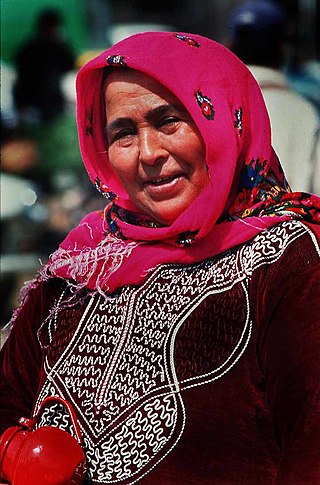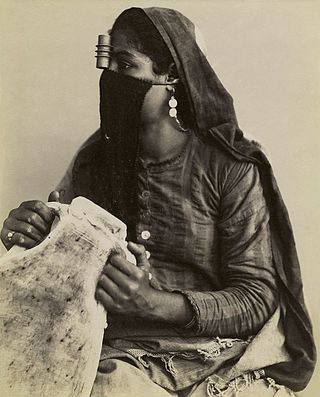Europe
| | This section needs expansion. You can help by adding to it. (June 2018) |
The present table provides a non-exhaustive overview comparing legal restrictions of face coverings in European states. The 2010 French ban on face covering is widely regarded as the most strict, prohibiting face coverings in almost all situations in public places, as opposed to limited restrictions in countries such as Denmark that only outlaws such practices in the context of public assemblies such as demonstrations.
| State | Since | Limitations (examples) | Situations | Exceptions | Notes |
|---|---|---|---|---|---|
| Austria | 2002, 2017 | Burqas, niqabs, motorcycle full face helmets or face-covering scarves [13] [14] | Demonstrations, universities, public transportation or courthouses [13] | Face covering for doing one's job [14] | |
| Belgium | 2011 | Burqas, niqabs and other masks [15] | In public (unspecified) [15] | Upheld by the ECHR in 2017 [15] | |
| Bulgaria | 2016 | Burqas, niqabs or other face-covering veils [16] | Government offices, schools, cultural institutions and places of public recreation [16] | Exceptions are allowed for health or professional reasons [16] | National ban was preceded by local bans in Bulgarian towns [16] |
| Denmark | 2000 | Hoods, masks, painting or objects that cover one's face and are worn in a way where it prevents identification [17] | Public assemblies [18] | Masking to protect one's face against the weather or worn for another worthy purpose [17] | Does not apply in Greenland or the Faroe Islands [17] |
| France | 2010 | Burqas, niqābs, motorcycle full face helmets, balaclavas, hoods and other face-covering veils [19] | Public places [19] | Full face helmets worn on motorcycles [19] | Upheld by the ECHR in 2014 [19] |
| Germany | 1985 | Items suitable and intended to prevent identification [20] | Open-air public assemblies or other open-air public events or on the way there [20] | Competent authorities may provide exemptions if there is no threat to public safety or public order [20] | |
| Italy | 1975 | Any mask or clothing that obstructs identification [21] | In public (unspecified) [21] | Exceptions are allowed for a "justified cause" [21] | There are disagreements whether one's religion is a "justified cause" [21] |
| Netherlands | 2019 | Burqas, niqabs, motorcycle full face helmets, balaclavas [22] [23] | Public transport, in buildings and associated yards of educational, governmental and healthcare institutions [22] | Face covering for doing one's job or sport, for health or security, in healthcare residences [22] | In force since 1 August 2019 [24] |
| Latvia | 2016 | Hoods, masks, burqas, niqabs or objects to cover one's face | Public places [25] [ needs update ] | Islamic face veil to be banned in Latvia[ needs update ] | |
| Norway | 1995 | Masks (unspecified) [26] | Public events such as demonstrations, marches, meetings, stands or similar [26] | ||
| Spain | 2013 | Face-coverings (unspecified) [27] | Public demonstrations [27] | ||
| Sweden | 2005 | Face-coverings (unspecified) that complicate identification [28] | Public demonstrations where public order is or may be disturbed [28] | Does not apply to religion-motivated face-coverings, or when demonstrators are authorised to cover their faces [28] |

Austria
In Austria since 2002, masking ban on demonstrations under § 9 of the Assembly Law (Versammlungsgesetz). Violation of the ban need not be prosecuted if the mask does not threaten public order and security. Violation of the ban entails, according to § 19a.b of the Law, imprisonment up to six months, repeated offenses one year or a fine.
Parliament approved new legislation on 16 May 2017, which stipulates that people who wear clothing that covers their faces, such as burqas, niqabs, full face helmets or scarves (motorcyclists) etc. in places like universities, public transportation or courthouses will face fines of 150 euros (about $167). The measure took effect in October 2017. [13] [14] Shortly after the enactment on 1 October 2017, there were some incidents in which people were incorrectly fined by the police, leading some commentators to point out flaws in the law, or incorrect understanding of it amongst the police. [14]
Belgium
A Belgian law adopted in June 2011 prohibits appearing in public "with a face masked or hidden, in whole or in part, in such a way as to be unidentifiable". Violations can result in fines and up to seven days in jail. On 11 July 2017 the ban in Belgium was upheld by the European Court of Human Rights (ECHR) after having been challenged by two Muslim women who claimed their rights had been infringed. [15]
Denmark
Wearing masks or other objects that cover the face in a way where identification is prevented during assemblies in a public place is illegal in Denmark. [17] [18] The Danish Penal Code § 134 b, effective from 3 June 2000, makes the violation punishable by a fine or up to six months imprisonment. Part 2 of § 134 b further criminalizes the possession of effects which must be viewed as intended to be used for masking in an assembly. The §134 b, part 3, exempts from penalty masking which is done to protect one's face against the weather or worn for another worthy purpose. [17] The ban does not apply in the autonomous territories of Greenland or the Faroe Islands. [17]
France
The French ban on face covering is an act of parliament passed by the Senate of France on 14 September 2010, resulting in the ban on the wearing of face-covering headgear, including masks, helmets, balaclava, niqābs and other veils covering the face in public places, except under specified circumstances.
Germany
Since 1985, according to § 17a Abs. 2 Versammlungsgesetz it is prohibited to disguise one's identity in public meetings such as demonstrations so as to prevent identification by police. This violation can be fined with imprisonment up to one year. [20]
Italy
In Italy, a law issued in 1975 strictly forbids wearing of any attire that could hide the face of a person. Penalties (fines and imprisonment) are provided for such behaviour. The original purpose of the anti-mask law was to prevent crime or terrorism. The law allows for exemptions for a "justified cause", which has sometimes been interpreted by courts as including religious reasons for wearing a veil, but others –including local governments– disagree and claim religion is not a "justified cause" in this context. [21]
Latvia
In Latvia, a law issued in 2016 to ban niqab and burqa in entire country was passed by Latvian parliament. [29]
Netherlands
In the Netherlands, a first attempt towards a partial prohibition on face covering was made from 2012 to 2015, but the bill was struck down. A new attempt was made in the years after when a new bill was submitted on 27 November 2015. Eventually a limited anti-mask law was passed on 26 June 2018. The law is called Instelling van een gedeeltelijk verbod op het dragen van gezichtsbedekkende kleding in het onderwijs, het openbaar vervoer, overheidsgebouwen en de zorg (Wet gedeeltelijk verbod gezichtsbedekkende kleding) ("Introduction of a partial ban on the wearing of face-covering clothing in education, public transport, governmental buildings and healthcare (Partial Face-Covering Clothing Ban Act)"). It is illegal to wear clothing which covers the entire face, or covered up to the point where only the eyes are uncovered, or renders the face unrecognisable, on public transport and in buildings and associated yards of educational institutions, governmental institutions and healthcare institutions. Frequently cited examples are a full face helmet, a balaclava, a burqa or a niqāb. Clothes exempt from the Act are:
- those worn by clients, patients or their visitors in residential parts of healthcare institutions;
- those necessary for the protection of the body in relation to health or security;
- those necessary in relation to the requirements made to the performance of a profession or sport.
On 26 June 2018, the bill was passed in the Dutch Senate. [23] [30] [22]
Norway
Concealment of faces in public is legal in Norway, except when taking part in a public event.
Exempted from the prohibition of concealment in public events are participants in theatre, masquerade or similar. In accordance with the Norwegian police law, violation is punishable by a fine or up to three months imprisonment. [26]
Russia
According to a Russian federal law "On assemblies, meetings, demonstrations, marches and picketing", Article 6 as of June 2012: [31] [32] [33]
- it is prohibited to wear masks and "any other means of hiding identity during public events;
- the organizer of an event must require all the people taking part not to use any means of hiding identity.
The punishment for the violation of the given law was introduced in July 2014 and is provided by the federal code on administrative offences. [34] [35]
Spain
According to the November 2013 Citizens' Security Law ( Ley mordaza [ es ]), demonstration protesters who cover their faces may be fined up to €30,000. [27]
Sweden
According to the 2005 'Law on the Prohibition of masking in some cases', it is prohibited for participants in the demonstration to fully or partially cover the face in a way that complicates identification. This prohibition applies only if there are disturbances of public order at demonstrations, or if there is an immediate danger of such disturbances. The ban does not apply to the covering of the face for religious reasons. It also does not apply to the extent participants are authorized (under 2 Ch. 7 a § Order Act) to fully or partially cover the face. [28]
Switzerland
In the cantons of Basel-Stadt (1990), Zurich (1995), Bern (1999), Lucerne (2004), Thurgau (2004), Solothurn (2006) and St. Gallen (2009), there are laws banning use of masks .[ citation needed ]
Ukraine
Several days after Berkut riot police clashed with Euromaidan protesters, Verkhovna Rada enacted law 721-VII banning wearing masks, helmets or camouflage clothing by people taking part in a gathering, assembly, demonstration, protest, rally or other mass event. Fines for violating are monetary up to about $400 or administrative arrest up to 15 days. [36] The law was repealed in January 2014. [37] [38] [39]
United Kingdom
For a century, covering or blacking one's face was a criminal act that could lead to the death penalty; the 1723 Black Act was repealed in 1823.












